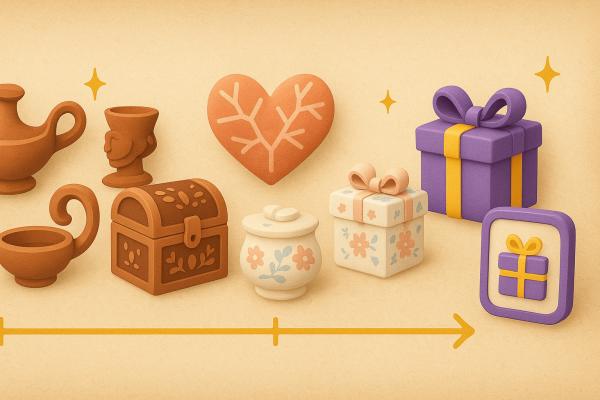Conținut

Gift-giving is one of humanity’s oldest social rituals. Long before the invention of wrapping paper and online wishlists, people across ancient cultures gave and received gifts to express loyalty, gratitude, respect, and affection. Though the practice has evolved, its purpose remains deeply human: to build connection, show thoughtfulness, and strengthen relationships.
This brief journey through history shows how gifting has shaped societies — and why it continues to matter in the modern world.
Gifting in Ancient Civilizations
In ancient Egypt, pharaohs exchanged elaborate gifts with foreign rulers as political tools to maintain peace and show power. These offerings weren’t just personal gestures — they were symbols of alliance, prestige, and diplomacy.
In Ancient Greece and Rome, gift-giving was central to festivals and religious rituals. Offerings to gods, gifts between hosts and guests, and tokens of gratitude reinforced both spiritual beliefs and social hierarchies.
In China, Confucian philosophy emphasized “li” — rituals of respect and propriety — which often included thoughtful gift exchanges. These traditions still echo in modern Chinese culture, where gift-giving plays a crucial role in business, family, and friendship.
Medieval and Feudal Gifts
During the Middle Ages, gift-giving helped solidify loyalty within feudal systems. Lords granted land or privileges to vassals as a sign of trust and dependence, while peasants might offer produce or crafted goods in return for protection. These gifts were more than practical — they symbolized belonging, duty, and respect.
The practice of exchanging gifts at Christmas began in earnest in Christian Europe during this era, blending religious symbolism with older pagan customs that celebrated winter and renewal.
Indigenous and Non-Western Traditions
In many Indigenous cultures, gifting is a core part of community life. The potlatch ceremonies of Pacific Northwest tribes, for example, involve giving away large amounts of wealth — not for personal gain, but to build social status, redistribute resources, and honor important events.
Similarly, in African and Polynesian cultures, gift exchanges are often reciprocal and ceremonial, acting as bonds of kinship and diplomacy.
These traditions show that across the globe, gifts have always served as tools for building trust, resolving conflict, and maintaining harmony.
Modern Gift-Giving: Still Deeply Symbolic
Today, gift-giving has become more commercial, especially during holidays like Christmas, Valentine’s Day, and birthdays. But the core motivations remain remarkably similar to those of our ancestors:
- Connection: We give to stay close to those we care about.
- Expression: A gift says what words sometimes can’t — “thank you,” “I love you,” “I’m thinking of you.”
- Ritual: Celebrations and milestones feel incomplete without the exchange of something meaningful.
Even in the digital age, a well-chosen gift carries emotional weight. It reflects effort, understanding, and presence — values that are increasingly rare in a fast-paced, distracted world.
Final Thoughts
From ancient temples to modern living rooms, the act of giving has always been more than a transaction. It’s a language — one that communicates respect, love, alliance, and gratitude across time and culture. In a world that often feels divided or distant, giving a gift — however small — is still one of the most powerful ways to say, “We belong to each other.”
